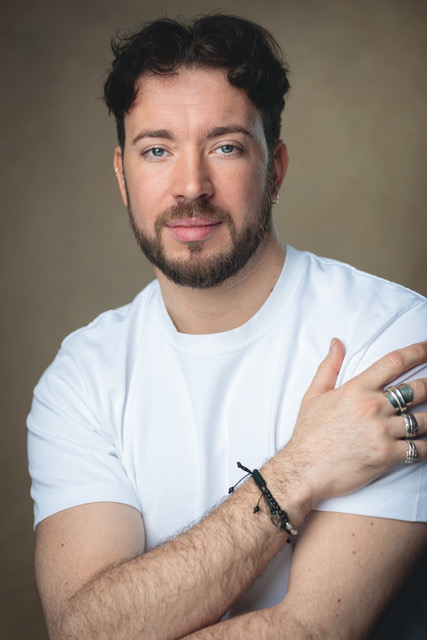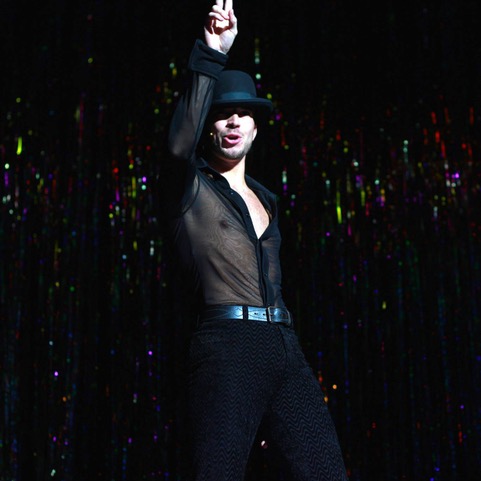Jacob Fearey je londonski plesalec, koreograf in ustvarjalec z več kot desetletjem izkušenj na gledališki sceni. Novembra v Ljubljani gostuje z zasedbo kultnega muzikala Chicago, ki bo navduševal v hali Tivoli. Ker so ga naše plesalke imele poleti priložnost spoznati na plesnem izobraževanju v Londonu in bile nad njim navdušene, smo ga povabili v Kazino in z njim organizirali delavnico theatre jazza. Še pred tem pa smo ga povabili tudi na kratek pogovor o plesu in svetu muzikala.
Jacob, najlepša hvala, ker si si vzel čas za nas med turnejo. Se veseliš nastopov v Ljubljani?
Res se veselim obiska Ljubljane. Je tako lepo mesto, z veliko šarma in res komaj čakam, da zaplešem za ljubljansko občinstvo. Zagotovo bo posebno doživetje.
So turneje običajno utrujajoče ali vznemirljive, morda oboje?
Turneje so vsekakor lahko tako izčrpajoče in hkrati navdušujoče. Res je odvisno od urnika in tega, kako je tura organizirana. Trenutno smo zelo zadovoljni, saj imamo v pogodbah veliko odmorov, tako da lahko obiščemo družino in prijatelje, se spočijemo. A ravno zaradi tega, ker ne nastopamo vsak večer, je včasih težje vzdrževati visok nivo energije, malce več časa potrebuješ, da se vrneš v ritem. Za ohranitev forme je ključnega pomena uravnotežena prehrana, hidracija in dovolj spanja. A kljub vsem izzivom, naravnost obožujem turneje. Sem zelo srečen, da lahko služim s tem, kar imam res rad, hkrati pa tudi raziskujem svet.
Kje na listi muzikalov je pri tebi Chicago? In za katerega bi rekel, da je tvoj res najljubši?
Chicago ima zelo posebno mesto v mojem srcu, tako osebno kot profesionalno. To je bil eden prvih muzikalov, ki sem jih videl kot otrok, in spomnim se, da sem bil povsem očaran nad glasbo. Še mesece zatem sem poslušal pesmi in plesal nanje. Prav tako je to muzikal, s katerim sem začel svojo profesionalno kariero pred 10 leti, tako da je res pomemben del moje poti. Zagotovo bi ga uvrstil visoko na seznam mojih najljubših muzikalov. Ima nekaj večnega in unikatnega – zaradi precizne koreografije, močne zgodbe in ikonične scenografije zagotovo izstopa. Bob Fosse in Gwen Verdon sta močno vplivala na moj stil koreografiranja, nastopati in poustvarjati njuno delo, pa seveda tudi reinterpretacijo Ann Reinking, je nič manj kot izjemno. Biti del tega šova je vsekakor velika čast.
Naše plesalke so te spoznale letos poleti na delavnicah v Londonu in domov prišle navdušene. Kakšen vtis pa so one pustile pri tebi?
Res mi je bilo v zadovoljstvo delati z njimi! Gre za zelo zagnane mlade ustvarjalke. Vedno uživam v dvorani s toliko potenciala. Zelo izpopolnjujoče je mladim predati znanje in orodja, ki jim pomagajo na plesni poti, tako na odru kot drugje. Sem zelo vesel, da so odšle z lepimi spomini.


Je London plesno središče Evrope? Si predstavljam, da je njegova plesna scena tako živahna kot mesto samo …
Zagotovo bi se strinjal, da je London plesna prestolnica Evrope. Mesto ima energijo in živahnost, ki odseva v njegovi neverjetni plesni sceni. Z izjemo Los Angelesa in New Yorka res ni veliko mest na svetu, ki ponujajo tako bogato kombinacijo svetovno znanih šovov, raznolikih plesih studiev, kulture, da ne omenjam vseh priložnosti, ki jih umetniki tukaj imamo. Že samo količina talenta in kreativnosti naredita to mesto eno najbolj zanimivih za plesalce in nadvse navdihujoče je biti del tega.
Spregovoriva na hitro še o theatre jazzu. Zaupal si nam, da bo na klasu velik poudarek na izraznosti. Kako pomemben je pravzaprav ta aspekt plesa? Tudi v tekmovalnem plesu.
Ekspresija in performans sta pogosto spregledana, a verjamem, da sta ključna. Čeprav je tehnika – kako se telo premika in prehaja – seveda zelo pomembna, podajanje zgodbe, čustva in performans koreografiji dajo življenje. Brez tega lahko izpade dolgočasna. Kot gledalec si želim, da me nekaj premakne, da plesalca začutim. Na tekmovanjih plesalcem pogosto dajem enake kritike, in sicer naj uporabijo obraz, izrazijo občutke … S plesom se je treba povezati na globlji ravni in občutke prenesti v performans. Seveda pa je izziv, da se take vrste izraznosti ni mogoče naučiti v tradicionalnem pomenu besede. Gre za občutke iz glasbe in zgodbe, ki sprostijo gibanje tvojega telesa. A ko plesalec končno doživi to “razsvetljenje”, to popolnoma spremeni način treninga in nastopanja, ga dvigne na povsem drug nivo. Ta čustvena povezanost naredi nastop nepozaben.
Kaj torej ti najprej opaziš, ko gledaš plesalca? Kaj te prepriča?
Najprej energijo. Neko prezenco, zaradi katere želiš tudi v sobi polni talentiranih plesalcev, gledati samo njega/njo. Ne govorim o tem, kako energetičen je njihov nastop, amapak o tem, akako svojo osebnost in energijo uresničijo skozi gibanje. Ko plesalec izraža tako avtentičnost in hkrati povezanost, te to takoj pritegne.
Imaš kakšen nasvet za mlade plesalke in plesalce Kazine?
Nikoli se ne primerjajte z drugimi. Sprejmite svojo unikatnost in jo živite. Vse delo, ki ga vložite danes, vam bo tlakovalo pot za prihodnost. Zato zaupajte procesu in si zapomnite, da je vsak korak, še tako majhen, korak bližje cilju, ki ga želite doseči.
Avtorica: Eva Mrhar
Jacob, thanks for taking your time for us while touring. Are you excited for the shows in Ljubljana?
I’m really excited to visit Ljubljana! It’s such a beautiful city with so much charm, and I can’t wait to perform for the amazing audiences there. It’s going to be a special experience!
Is touring usually exhausting or exciting, maybe both?
Touring can definitely be both exhausting and exhilarating. It really depends on the schedule and the way the tour is structured. Right now, we’re fortunate to have plenty of breaks built into our contract, so we’re able to visit friends and family and get some rest. But the trade-off is that not being in the show every night can make it harder to maintain stamina, so it takes a bit to get back into the rhythm. Staying on top of nutrition, hydration, and getting enough sleep are key to staying in good form. That said, despite the challenges, I absolutely love touring. I feel incredibly lucky to be able to see the world while doing what I love.
Where is Chicago on your list of musicals? Which would you say is your favourite and why?
Chicago holds a very special place in my heart, both personally and professionally. It was one of the first musicals I saw as a kid, and I remember being completely captivated by the soundtrack—I’d play it on repeat and dance around for months! It’s also the show that marked the start of my professional career 10 years ago, so it’s been a huge part of my journey.
I would definitely place Chicago near the top of my list of favourite musicals. There’s something timeless and unique about it—its sharp choreography, powerful storytelling, and iconic score make it stand out from so many other shows. As a choreographer, Bob Fosse and Gwen Verdon have had a major influence on my style, and getting to perform and recreate their work, along with the brilliant reinterpretations by Ann Reinking, is nothing short of incredible. Being part of this show feels like such an honor—it’s truly a one-of-a-kind experience.
Our dancers met you in London this summer and came back very happy with the experience. What was your impression?
It was such a pleasure working with them! They were very willing and enthusiastic group of young artists. I truly enjoy teaching a room full of potential—there’s something so rewarding about being able to share skills and tools that can help shape their journeys, both in performance and beyond. I’m glad to hear they left with positive memories!
Is London the dance capital of Europe? I imagine it’s dance scene is as vibrant as the city itself…
I would definitely agree that London is the dance capital of Europe. The city has an energy and vibrancy that mirrors its incredible dance scene. There aren’t many places in the world, outside of New York and LA, that can offer such a rich combination of world-class shows, diverse dance studios, and cultural landmarks, not to mention the many opportunities for artists to thrive. The sheer volume of talent and creativity here makes it one of the most exciting places for dance, and it’s always inspiring to be part of it.
Let’s talk about theatre jazz for a bit. You said in your class you’ll focus on expression. How important in mastering that aspect? How can it help in dance competitions?
Expression in performance is often overlooked, but I believe it’s absolutely crucial. While technical skill—understanding how the body moves and transitions—is vital, it’s the storytelling, emotion, and performance that truly bring a routine to life. Without that, it can feel flat and uninspiring. As an audience member, I want to be moved, to feel something from the artist.
In dance competitions, I often find myself giving the same feedback: “Use your face,” “Emote from your core,” “How does the choreography make you feel?” It’s about connecting with the dance on a deeper level and translating that emotion into your performance.
The challenge, though, is that this kind of expression isn’t something that can be taught in the traditional sense—it’s about feeling the music and the story, and then letting that flow through your movement. But when an artist finally has that “light bulb moment,” it completely shifts their approach to training and performing, elevating their artistry to a whole new level. That emotional connection is what makes a performance unforgettable.
What do you notice first when you see a dancer? What quality “persuades” you to think that’s a really good dancer?
The first thing I notice in a dancer is the energy they bring to their performance. It’s that magnetic quality—something about their presence that makes you want to watch them, even if they’re in a room full of talented dancers. I’m not talking about how high-energy or flashy they are, but rather how they channel their personality and energy through their movement. When a dancer can convey that authenticity and connection, it immediately grabs your attention. It’s the ability to bring themselves into the dance and make it their own that really marks them as a standout performer. That’s what makes a dancer truly captivating.
Any advice for our young dancers?
My advice for the young dancers at Kazina is to never compare yourself to anyone else. Embrace your individuality and be unapologetically you—your unique style, your journey, and your voice as an artist. The work you put in today, the dedication, and the passion you invest, will pave the way for greater success tomorrow. Trust in the process and remember that every step you take, no matter how small, is a step closer to where you want to be.